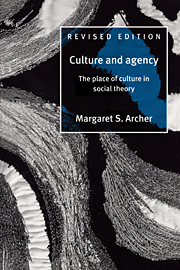1 - The Myth of Cultural Integration
Published online by Cambridge University Press: 02 December 2009
Summary
The conceptualization of culture is extraordinary in two respects. It has displayed the weakest analytical development of any key concept in sociology and it has played the most wildly vacillating role within sociological theory.
At the descriptive level, the notion of ‘culture’ remains inordinately vague despite little dispute that it is indeed a core concept In every way ‘culture’ is the poor relation of ‘structure’. Definition of the former has not undergone an elaboration equivalent to that of the latter. Consequently there is no ready fund of analytical terms for designating the components of the cultural realm corresponding to those which delineate parts of the structural domain (roles, organizations, institutions, systems, etc). Methodologically, such is the poverty of conceptualization that there are as yet no ‘units’ for describing culture: essentially cultures are still ‘grasped’, in contrast to structures which are now ‘analysed’. Basically the notion of cultures being structured is uncommonly rare outside of structuralism: instead of different ‘cultural structures’ there are endless ‘cultural differences’.
At the explanatory level the status of culture oscillates between that of a supremely independent variable, the superordinate power in society and, with a large sweep of the pendulum, a position of supine dependence on other social institutions. Hence, in various sociological theories, culture swings from being the prime mover (credited with engulfing and orchestrating the entire social structure) to the opposite extreme where it is reduced to a mere epiphenomenon (charged only with providing an ideational representation of structure).
Together, this descriptive vagueness and these theoretical vagaries, mean that culture occupies no clear place in sociological analysis.
- Type
- Chapter
- Information
- Culture and AgencyThe Place of Culture in Social Theory, pp. 1 - 22Publisher: Cambridge University PressPrint publication year: 1996
- 1
- Cited by



